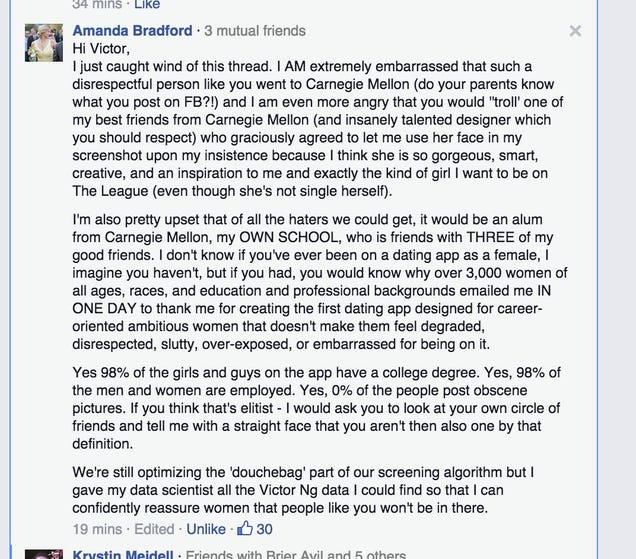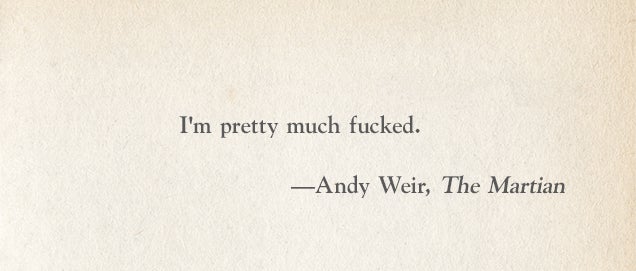
So, here is sad white man Jonathan Chait's essay about the difficulty of being a white man in the second age of "political correctness." In a neat bit of editorial trolling, New York teased the column with following question: "Can a white, liberal man critique a culture of political correctness?"
The answer, as anyone with internet access or a television or the ability to see a newsrack could tell you, is a resounding yes, they can and pretty much constantly do. But the second half of the question, and the real point of the column, was left unwritten: Can a straight, white man do this without having to deal with people criticizing him for doing so? The answer, in 2015, is no, and that is what has Chait's dander up.
Earlier this month,
Deadspin's Greg Howard posted a video
A year ago, Jonathan Chait
had an extended debate with The Atlantic's Ta-Nehisi Coates, an incredibly talented writer whose ongoing research and thinking on race and American politics and history have led him to become one of our foremost critics of American liberalism as a credo and philosophy. Chait, a strong believer in the righteousness of American liberalism, could not let it go, and he went on to embarrass himself.
Chait was further incensed when His People lost control of The New Republic, the political magazine where Chait was a columnist and editor for many years. Chait, along with a number of other current and former New Republic contributors, protested the loss of their version of the magazine, but they seemed to be unprepared for the response: It was not universal outrage and grief. Instead quite a lot of people—including, again, Coates—seemed to think that Chait's New Republic had been a hotbed of the most poisonous form of American "liberalism," a place where a cadre of white people with degrees from the best schools debated amongst themselves whether or not black Americans were worthy of equal treatment under the law, and even whether black Americans were genetically equal to whites.
Chait, like many liberal commentators with his background, is used to writing off left-wing critics and reserving his real writerly firepower for (frequently deserving) right-wingers. That was, for years, how things worked at the center-left opinion journalism shops, because it was simply assumed that no one important—no one who really matters—took the opinions of people to the left of the center-left opinion shop seriously. That was a safe and largely correct assumption. But the destruction of the magazine industry and the growth of the open-forum internet have amplified formerly marginal voices. Now, in other words, writers of color can be just as condescending and dismissive of Chait as he always was toward the left. And he hates it.
Following his faux apologia for his support for the Iraq War, Chait, sounding personally wounded, bemoaned those who told people like him to "shut up and go away." His philosophical position is that it is undemocratic—dangerously undemocratic, in fact—to tell Jonathan Chait to "shut up and go away." It might be rude, and personally hurtful to Jonathan Chait, to tell him to shut up and go away (trigger warning: telling Jon Chait to shut up and go away), but he should perhaps try to remember that "shut up and go away" was his own magazine's editorial position towards the entire left for the whole of the Marty Peretz era.
So, to once again answer New York's question, straight white men could (and did) viciously attack "the culture of political correctness" as much as they pleased back in the day, and no one who mattered ever seemed particularly bothered by it. Now, not only is it harder to avoid reading negative feedback from people with different perspectives than you, especially if you engage online at all, but there are actually important people—people with status, who've won awards and hold positions of authority—who listen to those people with different perspectives. Ta-Nehisi Coates is at The Atlantic, for godssake, not In These Times.
These are fundamental attacks on Chait's identity by people he cannot merely dismiss as cranks. Lashing out is only natural. When men like Chait are exposed to criticism of this nature for the first time, they generally respond with operatic self-pity. And then we get a column or an essay or a book about how people who criticize straight white men are Actually The Problem. This is Chait's On Snark
Chait is understandably upset that the left is playing dirty by impugning his view of himself as a good, tolerant liberal, on the side of justice. No one wants to hear that the place that they worked for many years was actively fighting for white supremacy! But it's fun to imagine Chait responding to the equivalent of this piece written by a conservative, about liberals. Chait understands the absurdity of the conservative position that to be accused of racism is worse than racism itself. He accurately notes that when conservatives bemoan "political correctness" they are generally upset that they have been asked to be respectful of people of different backgrounds. He simply cannot take that next step, and admit that perhaps his own concern about the proliferation of dangerous anti-speech Marxists and Social Justice Warriors is actually misplaced anxiety about his getting called on his shit.
But Chait is careful not to litter his essay with examples taken from his own run-ins with the PC Police. This is a Serious Essay about Political Correctness Gone Mad, not the whinings of a petulant man-baby. So let's take his argument seriously. How is political correctness hurting America, and liberalism? Apparently, because of social media, the censorious new New Left has moved beyond academia and "attained an influence over mainstream journalism and commentary beyond that of the old." Because you can now be subject to a great deal of abuse and criticism for saying something un-p.c., certain people no longer want to engage in political debates at all. And so, democracy suffers.
It's getting so that white people are afraid to speak their minds:
Under p.c. culture, the same idea can be expressed identically by two people but received differently depending on the race and sex of the individuals doing the expressing.
This is a well-documented and obvious point, only for some reason it says "Under p.c. culture" instead of "everywhere." As I'm sure Chait is aware, women who write cutting and incisive columns about politics are constantly subject to sexist abuse of the sort he never has to deal with, and people of color who write the same sorts of things as Jonathan Chait face similarly endless torrents of racist abuse. Straight, white men, though, are sometimes called racist, which we can all agree is hurtful in its own way.
It's not just angry Twitter nobodies, either! "[Political correctness] also makes money," Chait says, using, as his example, one BuzzFeed post about microaggressions that has "received more than 2 million views." I'm guessing that Chait makes quite a bit more money than the person who compiled that post. In fact, that's true of nearly everyone who is presented as a victim of political correctness in Chait's essay, from millionaire comedian Bill Maher to the anonymous professor at a prestigious university: They all enjoy superior social status to the people who are supposedly silencing or terrifying them. It's hard to see how democracy was significantly harmed by Condoleezza Rice not giving a commencement address.
But if Chait can't prove his thesis, he can at least repeatedly assert it. "While politically less threatening than conservatism (the far right still commands far more power in American life), the p.c. left is actually more philosophically threatening. It is an undemocratic creed."
I.e., while The Left still has no real power in American politics and only some small pockets of influence in academia and the media, they still concern me a great deal because they are more likely to wound my pride and sense of self-worth as a good liberal than conservatives are, and so therefore they pose a real threat to democracy.
As we get to the end of Chait's essay, we can tally up the casualties of political correctness. One anti-abortion protester was shoved and had her sign vandalized. A few millionaires were disinvited from college campuses, and performances of two plays were canceled. Various people feel disinclined to engage in online debates. Participants in a Facebook group had to deal with a Bad Thread. And a college student was fired from his school newspaper. That's one person whose life was in any meaningful way made materially worse by the scourge of political correctness, in nearly 5,000 words of dire warnings about the philosophical threat posed by left-wing speech policing.
Do you know who else once called for a journalist to be fired for allowing wrongthink to be published? Jonathan Chait, who in 2009 called for the firing of a Detroit Free Press editor for allowing a columnist with opinions about the head coach of the University of Michigan football team to report on the head coach. The columnist wasn't even as blatantly biased as Chait claimed.
Excessive speech-policing by overzealous campus activists certainly happens. But Chait is wildly exaggerating the threat it poses—calling it a "philosophical threat" to liberalism, instead of a minor annoyance people like Chait have to deal with in the brief period just before they officially assume their positions in America's power elite. (This wouldn't be the first time Chait has inflated a perceived threat to America to existential proportions.)
In reality, the single most notable example in the last 15 years of an academic being punished for his speech is probably former University of Colorado professor Ward Churchill, who was fired not for offending feminists but for claiming that some victims of the September 11 attacks were complicit in the crimes of the American state that provoked the attacks. Just a few years ago, liberal Democratic members of Congress and other officials publicly demanded that Brooklyn College cancel a forum featuring academics who support a financial boycott of Israel. Lawmakers threatened to withhold funding from the school if the event took place. Just this month, Duke University announced
In Chait's narrative, left-wing political correctness threatened American democracy once before, in the 1980s. But it was vanquished by a brave man from a place called Hope:
Bill Clinton’s campaign frontally attacked left-wing racial politics, famously using inflammatory comments by Sister Souljah to distance him from Jesse Jackson.
That Chait, in 2015, is still praising Clinton's "Sister Souljah moment" as a heroic victory in the war against political correctness is telling. What was that moment but the drawing of a party line against expression deemed offensive? Bill Clinton attacked Souljah for her speech. He performed outrage for the sake of identity politics. The attack on a rapper most Americans had no familiarity with was simply part of Clinton's cynical scheme to signal to aggrieved whites that he was not beholden to the black community. The culmination of that scheme was the execution of mentally impaired black man named Rickey Ray Rector. If that's the variety of American liberalism that political correctness threatens, please direct me to the local thought police recruitment center.
[Illustration by Jim Cooke]


































